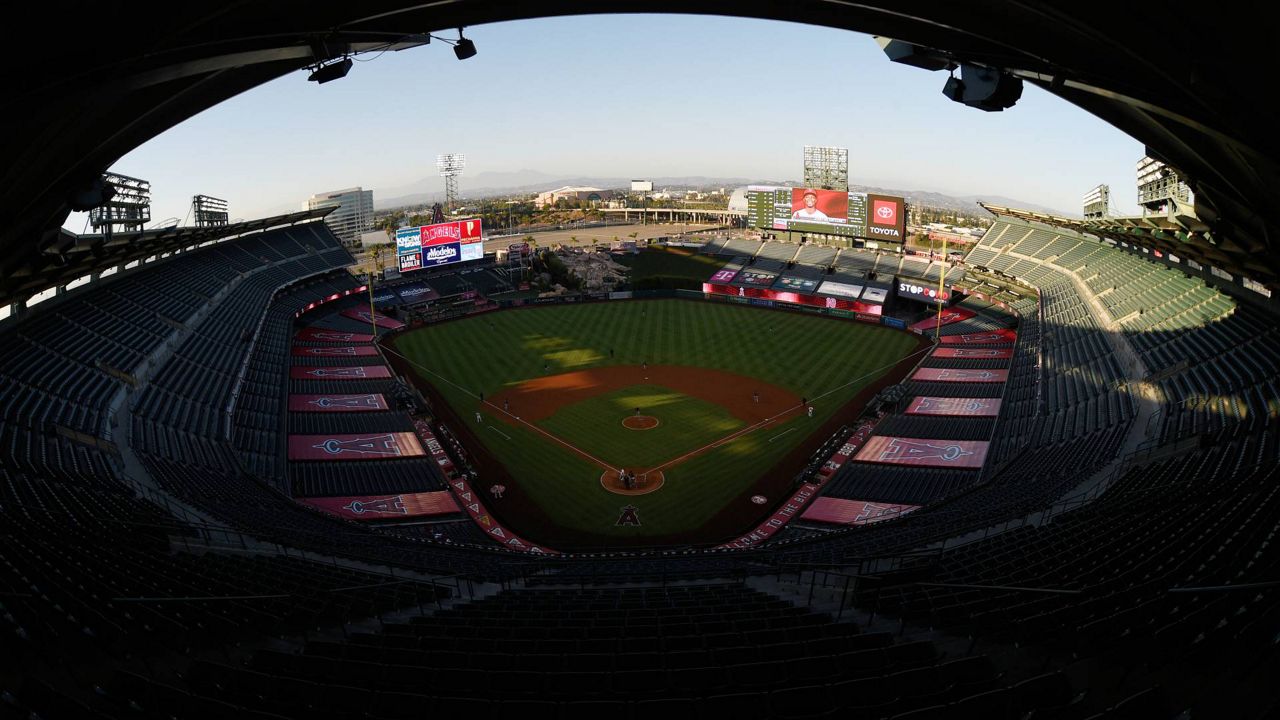ANAHEIM, Calif. (CNS) — The state Department of Housing and Community Development Wednesday sent a notice of violation to Anaheim regarding the city's plan to sell and develop property at Angel Stadium — saying the plan violates the Surplus Land Act and its requirements for encouraging lower-income housing.
What You Need To Know
- Plans to sell and develop property at Angel Stadium violates the Surplus Land Act, California housing authorities told Anaheim city leaders
- The state Department of Housing and Community Development issued the notice in a letter to city attorneys last week
- The state agency planned to send an official notice of violation to the city of Anaheim Wednesday
- State housing officials began examining the sale of the Angel Stadium property last fall
The move followed a letter from the state agency, sent to city attorneys last week, warning of the alleged violation, Anaheim spokesman Mike Lyster said Wednesday.
A proposal to add more affordable housing elsewhere in the city within a decade apparently was not enough to deflect the HCD's citation.
The city has 60 days to "cure or correct the alleged violation," according to the notice.
The city has these three steps to adhere to the agency's requirements:
- Set aside at least 80% of the development for housing, make 40% of it affordable housing, and offer half of the affordable housing units to "very low-income households," according to the notice
- Go with a "mixed-use exemption" that declared the land "exempt," and put out a competitive bid to qualified bidders, and apply a covenant requiring at least 25% affordable for low-income families
- Declare the land surplus, post a notice of availability for 60 days, engage in "good-faith negotiations for 90 days with any entities that respond" and provide affordable housing for low-income families
City officials dispute that the property falls under the surplus land requirements because it is being leased for a baseball stadium.
"We determined early on and continue to hold that the stadium site is unique and does not fit the definition of surplus land," Lyster said. "It is under lease for Major League Baseball for the next 17 years. ... It does not fit the definition of surplus, unneeded government land."
There is an exemption in state law allowing development when it spurs economic activity that benefits residents, which city officials maintain is the case with the Angels project, which essentially involves development of the parking lot property with residences and various businesses.
At issue is how to achieve the affordable housing goal, Lyster said.
City officials have proposed 25% affordable housing, but it would be off-site, because officials say the units could be produced faster apart from the stadium project, he added.
"Doing it through the stadium project takes a lot longer," Lyster said.
Some of the affordable housing could be built near the stadium and some elsewhere in the city, but, "We can turn those around in a few years," Lyster said.
City officials want to keep negotiating with agency officials to address their concerns that selling the stadium property to SRB Management, a business partnership of Angels owner Arte Moreno, without first soliciting proposals from affordable housing developers runs contrary to the Surplus Land Act.
"We remain committed to the project and confident in the paths we have ahead of us," Lyster said. "First and foremost we welcome the opportunity to talk with them and hearing very specific concerns they have and how to move forward in a way that works for everyone."
Related Stories
- To Anaheim and Beyond: Disney Lays Groundwork for Major Expansion of Disneyland Resort
- California to Let Major League Baseball, Disneyland Reopen April 1
- Facing Massive Budget Shortfall Due to Coronavirus, Anaheim Looks to Borrow $185 Million
- Anaheim Ducks Owners Submit New Plans for $3 Billion Mega Mixed-Use Project
State housing officials began examining the sale of the Angel Stadium property last fall, and in April, they issued a preliminary finding that the state law to promote affordable housing had likely been violated.
The December 2019 deal with SRB Management included plans to develop restaurants, shops, offices, hotels, homes and a new or renovated stadium in exchange for $150 million in cash to the city and another $170 million in community benefits, including affordable housing and a public park.
"We are undeterred," Mayor Harry Sidhu said.
"For far too long, the future of baseball in Anaheim has been an unresolved issue. We have heard loud and clear from our community that they want baseball to stay. Our plan does just that and brings affordable housing, parks and new revenue to serve our neighborhoods. This is a defining moment for affordable housing in our city. It would be the single largest expansion of affordability Anaheim has ever seen. It's frustrating to hear that may not be enough. We remain committed to our stadium plan and are confident we'll find the right path forward."



